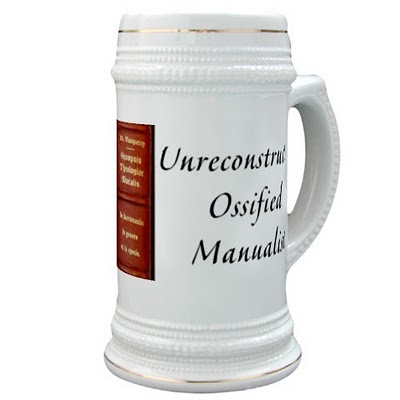Mugs, manuals and Newman
Father Z has been busy designing new mugs. I enjoyed his post today about the Unreconstructed Ossified Manualist mug, "sure to bolster solid priests and annoy liberals everywhere."
Father is right in pointing to the wholesale ditching of theological and moral manuals in the wake of the second Vatican Council. I hope you don't need me to point out that there is nothing in the Council to justify such a radical departure. There were some drawbacks with the manualist approach, particularly if the lecturer did not inject any life into the course or allow students to ask questions.
We also need to take account of theology that has been written recently: further investigation of some of the work of St Thomas, for example (and possibly refutation of some of the wilder speculation which is contrary to the magisterium.) The moral manuals would have needed new material on bioethical questions and social teaching.
Rather more important that those reservations is to remind ourselves of what Optatam Totius had to say on the teaching of dogmatic theology:
I am in awe of the depth of scholarship shown in a manual such as the STS and use books like that in informing my own teaching. When teaching dogmatic theology, it is important not to leave out anything that is essential; it is therefore also important to discern what is and is not essential. Some of the more arcane historical disputes may be passed over in favour of ensuring that enough time is available for theological questions that are more "live" today. Nevertheless, it is surprising how some questions that have been neglected in recent years can shed light on current debates over pastoral practice.
So I suppose I would not be an entirely unreconstructed ossified manualist - neither would Fr Z, of course. But it is a good joke to have a mug with this inscription. Here is the standard blurb for the beer stein which I will be ordering:
It didn't make it onto the list of official merchandise for the Beatification. Here is the full graphic (a quotation from Newman's Essay on the Development of Christian Doctrine):
Father is right in pointing to the wholesale ditching of theological and moral manuals in the wake of the second Vatican Council. I hope you don't need me to point out that there is nothing in the Council to justify such a radical departure. There were some drawbacks with the manualist approach, particularly if the lecturer did not inject any life into the course or allow students to ask questions.
We also need to take account of theology that has been written recently: further investigation of some of the work of St Thomas, for example (and possibly refutation of some of the wilder speculation which is contrary to the magisterium.) The moral manuals would have needed new material on bioethical questions and social teaching.
Rather more important that those reservations is to remind ourselves of what Optatam Totius had to say on the teaching of dogmatic theology:
Dogmatic theology should be so arranged that these biblical themes are proposed first of all. Next there should be opened up to the students what the Fathers of the Eastern and Western Church have contributed to the faithful transmission and development of the individual truths of revelation. The further history of dogma should also be presented, account being taken of its relation to the general history of the Church. Next, in order that they may illumine the mysteries of salvation as completely as possible, the students should learn to penetrate them more deeply with the help of speculation, under the guidance of St. Thomas, and to perceive their interconnections. They should be taught to recognize these same mysteries as present and working in liturgical actions and in the entire life of the Church. They should learn to seek the solutions to human problems under the light of revelation, to apply the eternal truths of revelation to the changeable conditions of human affairs and to communicate them in a way suited to men of our day.All of these elements are to be found in the older manuals of dogmatic theology. One of my own favourites is the four volume Sacrae Theologiae Summa (STS) produced by the Spanish Jesuits in 1955 and published with the highly respected BAC imprint. They also communicated in a way suited to the men of their day: that element would need to be updated for the men of today who, in Europe at least, live in a vastly more secularised environment.
I am in awe of the depth of scholarship shown in a manual such as the STS and use books like that in informing my own teaching. When teaching dogmatic theology, it is important not to leave out anything that is essential; it is therefore also important to discern what is and is not essential. Some of the more arcane historical disputes may be passed over in favour of ensuring that enough time is available for theological questions that are more "live" today. Nevertheless, it is surprising how some questions that have been neglected in recent years can shed light on current debates over pastoral practice.
So I suppose I would not be an entirely unreconstructed ossified manualist - neither would Fr Z, of course. But it is a good joke to have a mug with this inscription. Here is the standard blurb for the beer stein which I will be ordering:
Heft a cold one in this 22 oz. ceramic stein with gold trim. A great “usable” alternative to the trophy. Make any day Oktoberfest whether with this impressive stein on the shelf or in-hand. Cheers!While I'm at it, I must get one of the Blessed John Henry Newman mugs too:
It didn't make it onto the list of official merchandise for the Beatification. Here is the full graphic (a quotation from Newman's Essay on the Development of Christian Doctrine):


